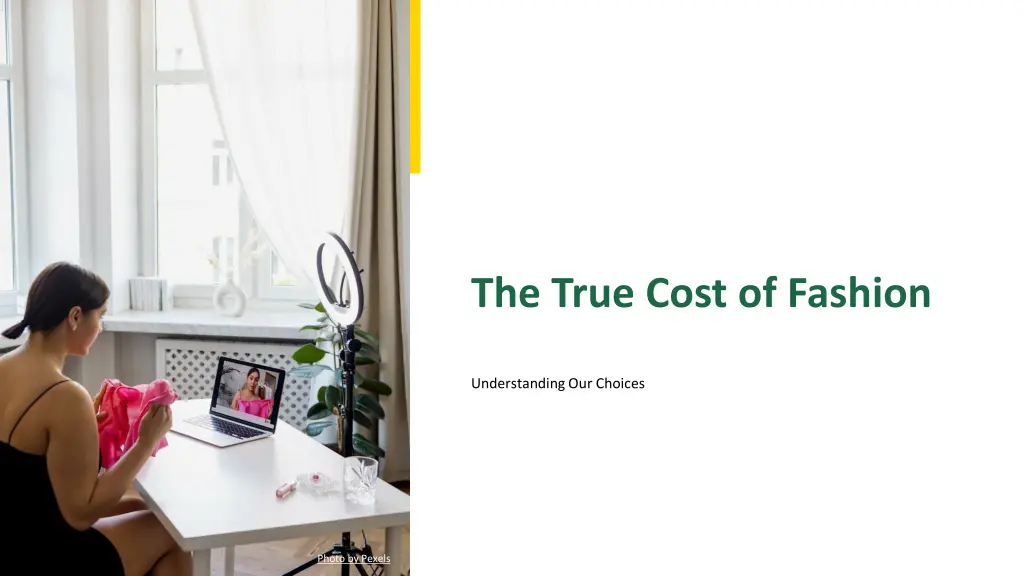
Understanding the True Cost of Fashion and Our Choices
Delve into the hidden costs of fast fashion, explore the impacts of consumerism, factory disasters, decline of local industries, and environmental degradation. Discover the importance of fair trade initiatives, raising awareness, and advocating for systemic change in the fashion industry for a sustainable future.
Download Presentation

Please find below an Image/Link to download the presentation.
The content on the website is provided AS IS for your information and personal use only. It may not be sold, licensed, or shared on other websites without obtaining consent from the author. If you encounter any issues during the download, it is possible that the publisher has removed the file from their server.
You are allowed to download the files provided on this website for personal or commercial use, subject to the condition that they are used lawfully. All files are the property of their respective owners.
The content on the website is provided AS IS for your information and personal use only. It may not be sold, licensed, or shared on other websites without obtaining consent from the author.
E N D
Presentation Transcript
The True Cost of Fashion Understanding Our Choices Photo by Pexels
01 Unveiling Fast Fashion Table of Contents 02 The Cost of Consumerism 03 Factory Disasters: Wake-Up Call 04 Decline of Local Industries 05 Environmental Degradation 06 Fair Trade Initiatives 07 Awareness is Power 08 Mental Health Connection 09 A Call for Systemic Change 10 Thank You for Your Attention
1 Unveiling Fast Fashion An Eye-Opening Journey Fast fashion masks the real price of clothing, concealing the human and environmental costs beneathour trendyoutfits. Widespread consumer demand fuels a system where the quest for profitovershadows ethical manufacturingpractices. We often overlook our role in this cycle, blind to the repercussions of our choices on global communities. Understanding this connection is vital in reshaping our views on what we wear and why. Photo by Pexels
2 The Cost of Consumerism A Global Consequence Every item of clothing connects us to a world where overconsumption leads to waste and environmental degradation. The thrill of shopping fosters a culture that prioritizes quantity over quality, often at the expense of ethics. As consumers, we must recognize our power to drive change by making informed purchases. This awareness can effectively break the cycle of overconsumption that harms our planet and its people. Photo by Pexels
3 Factory Disasters: Wake-Up Call Human Toll Tragedies in factories serve as stark reminders of the human cost involved in producing cheap clothing. These events reveal the unsafe working conditions that many laborers face in the name of profit. We have a responsibility to acknowledge these sacrifices and advocate for better labor practices. Change begins with awareness and collective action to ensure a safer future for garment workers. Photo by Pexels
4 Decline of Local Industries A Troubling Trend The influx of cheap, often donated clothing undermines local industries, leading to significant job losses. Communities once reliant on local garment production now face economic instabilityand poverty. Supporting local businesses can reinvigorate economies and foster sustainable practices. By choosing to buy locally, we not only uplift communities but also combat the fast fashion epidemic. Photo by Pexels
5 Environmental Degradation Silent Yet Deadly The fashion industry s practices contribute heavily to pollution,waste, and depletion of natural resources. Synthetic materials and toxic dyes harm ecosystems and the health of communities. To preserve our planet, we need to advocate for sustainable production methods and eco-friendlymaterials. Immediate action is necessary to mitigate the environmental impact caused by the fashion industry. Photo by Pexels
6 Fair Trade Initiatives A Path Forward A rising movement for fair trade practices promotes ethical manufacturing that supports workers' rights. Brands committed to sustainability demonstrate that profitabilityand ethics can coexist harmoniously. Consumers can drive this change by choosing brands that prioritize fair trade and transparency. Collectively, we can reshape the fashion narrative and promote responsible consumption. Photo by Pexels
7 Awareness is Power Consumer Education Many consumers remain unaware of the consequences behind their choices, limiting their ability to make informed decisions. Education on ethical consumption illuminates the true cost of clothing, empowering consumers to make a difference. Understanding our impact can inspire more conscious purchasing habits and motivate systemic change. The first step towards change is awareness; let s spread the word about our choices. Photo by Pexels
8 Mental Health Connection Consumption vs Happiness Increasing materialism correlates with declining mental health, challenging the idea that more possessions lead to happiness. The fashion industry feeds this cycle, encouraging endless consumption without fulfillment. Reevaluating our relationship with material goods can lead to a more satisfying and balanced life. Choosing experiences over things fosters a healthier mindset and a more sustainable lifestyle. Photo by Pexels
9 A Call for Systemic Change Time for Action Our economic system must undergo a transformation to address exploitation and environmental issues in the fashion industry. Advocating for humane and sustainable approaches is crucial in reshapingour industry. Together, we can push for policies and practices that prioritize people and the planet over profit. Let s unite in our mission for a more ethical fashion future, one choice at a time. Photo by Pexels
10 Thank You for Your Attention Join the Movement We appreciate your time in exploring the complex world of fashion with us. Your choices matter empower yourself to make ethical decisions in your clothing purchases. Together, let s create a brighter, more sustainable future for all. Thank you, and let s continue this important conversation about fashion s true cost. Photo by Pexels
